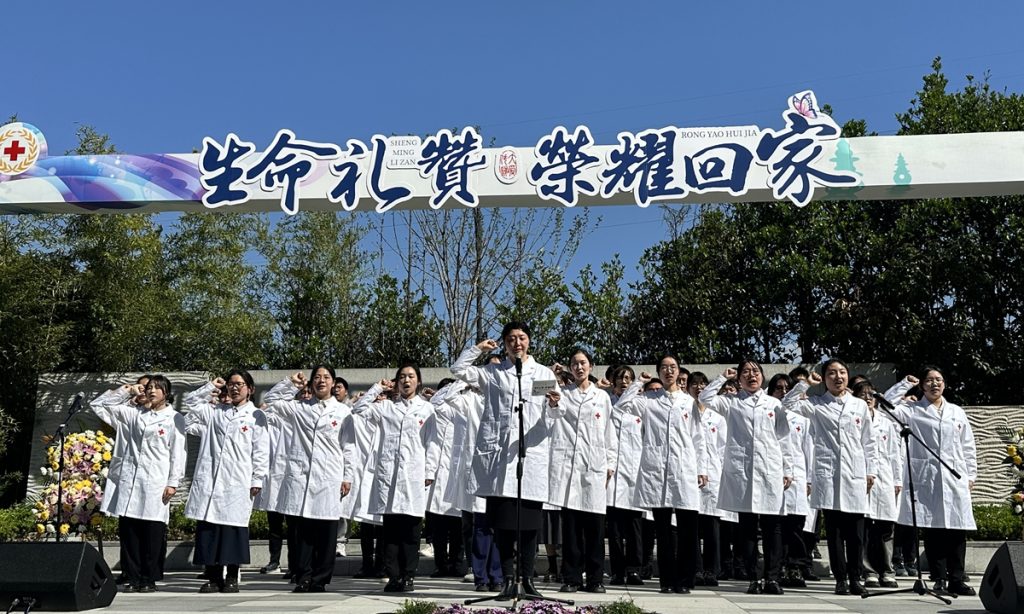6.7m people in China signed up for organ donations

China's annual national commemoration event for human organ donation was held in Hangzhou, East China's Zhejiang Province on Sunday. In recent years, significant progress has been made in China's body and organ donations, but there is still a large gap in medical supply and demand and there is still much work to be done in terms of social awareness for the cause.
Statistics show that there are more than 6.7 million registered organ donors nationwide. There have been more than 51,000 cases of posthumous organ donation and more than 158,000 organs donated, saving the lives of 150,000 people.
In order to carry forward organ donors' spirit of altruism throughout society, more than 220 memorial sites have been established nationwide.
This national annual event, which is also a publicity and promotional activity for organ donation, is guided by the Red Cross Society of China and the National Health Commission, and organized by the China Organ Donation Administrative Center (CODAC). It includes activities such as laying flowers at cemeteries, evening parties, academic lectures and work meetings.
On Saturday afternoon, a memorial event for organ donors was held at a cemetery in the outskirts of Hangzhou. After some donors were given eco-burials on site, attendees presented flower baskets to them and offered condolences to their families.
A ceremony was later held at the Zhejiang Provincial People's Congress Hall on Sunday. Through various forms such as storytelling, stage plays, recitations, and song and dance, the event focused on showcasing the touching stories and the spirit of great love of organ donors and their families, organ transplant recipients, organ donation coordinators, medical personnel and Red Cross workers and volunteers.
Members of the Expert Committee of the CODAC issued a collective call, urging organ donation and transplantation workers to contribute more to the high-quality development of the human organ donation cause, and calling on people from all walks of life to care about and support the cause, making a positive contribution to the promotion of socialist spiritual civilization.
In China, the Qingming Festival and the days before the festival are a time for beneficiaries and people from all walks of life to remember organ donors. Over the past few days, various provinces such as Jiangsu in East China, Hainan in South China, Sichuan and Chongqing in Southwest China, and Hebei in North China, have organized local memorial ceremonies.
Hou Fengzhong, head of the CODAC, told the Global Times that this reflects the deepening understanding and recognition of organ donations in Chinese society.
From only 34 cases of organ donation in 2010 to 6,454 cases in 2023, the total number of organ donations has exceeded 51,000. The number of registrants for organ donation reached 6.7 million today from 1,087 in 2010. The concept of donation is gradually gaining widespread recognition and support in society, Hou said, pointing out that a new social trend of participating in and supporting donation efforts is emerging.
In December 2023, the State Council, China's cabinet, issued the Regulation on Human Organ Donation and Transplantation, which will take effect on May 1 and was refined from regulations on human organ transplantation issued in 2007. The new rules highlight the publicity of organ donation to advance its further development and optimize the conditions and procedures for organ donation following the Civil Code.
Hou told the Global Times that the promulgation of this new regulation is significant in two aspects. First, the regulation includes provisions on organ donation, whereas previous regulations only focused on organ transplantation. Second, the regulation includes provisions on organ procurement and distribution, which are issues of great concern to society, making the entire process more transparent and fair.
According to public reports, China has ranked second in the world and first in Asia for the number of annual organ donations and transplants for the past seven consecutive years. However, there is still a significant gap between actual medical demand and the amount of organ donations in the country.
Based on current data, the ratio of actual organ donations to the number of people waiting for organs is approximately 1:6. However, the actual situation is even more severe, as many people on the waiting list are unable to receive organs, Hou told the Global Times.
"Taking this into consideration, the ratio is closer to 1:30, meaning that for every 30 people in need of organs, only one person is able to successfully receive a transplant," Hou said.
The head of CODAC said that compared with developed countries, China is already at the forefront of organ transplant technology. For China's organ donation cause, what is most needed to change is the overall social concept, especially some traditional beliefs that "the body cannot be destroyed," Hou said, urging joint efforts from all sectors of society.